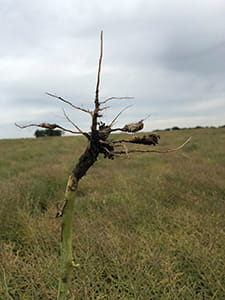By Raul Avila, MSc, PAg, Provincial Specialist-Pest regulatory, Crops and Irrigation Branch, Regina and
Alireza Akhavan, PhD, AAg, Provincial Specialist-Plant Disease, Crops and Irrigation Branch, Regina
Clubroot is caused by the soil-borne pathogen Plasmodiophora brassicae, which affects brassica crops, including canola. This pathogen can form galls on infected plants, disrupting the plant's ability to absorb water and nutrients. Galls vary in size and are often accompanied by wilting, early ripening and stunted growth that can lead to yield loss in highly infected areas.

Early detection is key to effectively managing clubroot. Monitoring for clubroot is not only essential for crop health but also for economic reasons, reducing the need for costly interventions or crop losses. Monitoring for clubroot is essential, even in a dry year, as resting spores remain present. Here are a few recommendations you can implement to reduce the negative impacts of clubroot:
- Monitoring: clubroot spores can persist in soil for many years. It is important to scout fields for any visible symptoms. In addition, soil sampling your fields can help you detect the pathogen early before visible symptoms appear. Regular soil testing also allows growers to monitor clubroot pathogen level changes over time. This fall, the Ministry of Agriculture and SaskCanola offered free clubroot soil testing bags to producers and agrologists.
- Resistant cultivars: using resistant clubroot varieties in all canola fields is a key strategy in managing this pathogen. Talk to your agrologists and start planning the next growing season.
- Rotations: crop rotations disrupt the life cycle of the clubroot pathogen. By planting non-host crops (plant species outside of the Brassicae family), you are limiting the pathogen’s ability to increase and maintain its spore levels. It is recommended to use a three-year rotation, so, a two-year break from canola. This will delay development of resistance-breaking strains of the pathogen by reducing its exposure to resistant crops.
- Biosecurity: clubroot can be spread through any soil movement, especially on equipment. It is essential to clean and disinfect equipment between fields. Producers implementing biosecurity practices are also taking steps to prevent inadvertent movement of clubroot spores to new locations.
Proactive integrated pest management allows producers to make informed decisions, implement targeted control measures and protect their crops while minimizing the risk of spreading the pathogen to other fields.
For more information on clubroot, please visit the Saskatchewan Ministry of Agriculture’s website, contact your local crops extension specialist, or contact the Agriculture Knowledge Centre at 1-866-457-2377.
